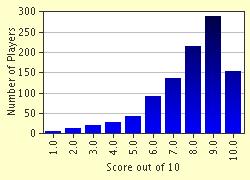Quiz Answer Key and Fun Facts
1. "Meemies" are thought to be an onomatopoetic term for a particular type of artillery shell used in World War I. It is clear that if you are "meemies", there is only one thing you can do. What is it?
2. Only one kind of "turpitude" seems ever to be designated. What variety would that be?
3. You hold the snifter in your hand, swirling the liquid it contains. You know the kind of beverage in the glass because there seems to be only one variety of snifter. What drink do snifters invariably seem to contain?
4. Got troth? I think there is only one thing you can do with it. What seems invariably to be done with troth?
5. Adverbs can be just as choosy about their company as nouns, verbs and adjectives. If one wishes to do something balefully, what will it most likely be?
6. If you see the word "hackles" in a sentence, in what state are said hackles most likely to be?
7. Great news. Something has just redounded to you. What would that most likely be?
8. Some things seem most often to be mentioned when we lose them. Which of the following are people more often described as being "out of" than "in"?
9. What is it that seems invariably to come with crannies?
10. In the 1980s, Elliot Moreton coined a term, "stormy petrel", intended to indicate words that are never used except with another particular word or words. I believe that few words actually qualify for this designation, but "shrift" may be one that does. What is the only size shrift seems to come in?
Source: Author
uglybird
This quiz was reviewed by FunTrivia editor
fringe before going online.
Any errors found in FunTrivia content are routinely corrected through our feedback system.

